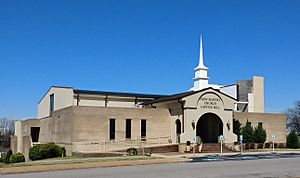First Baptist Church, Capitol Hill facts for kids
Quick facts for kids First Baptist Church, Capitol Hill |
|
|---|---|
 |
|
| Location | Nashville, Tennessee |
| Architect | L. Quincy Jackson (1972 remodel) |
| Lua error in Module:Location_map at line 420: attempt to index field 'wikibase' (a nil value). | |
The First Baptist Church, Capitol Hill is an important Baptist church located in Nashville, Tennessee. This church played a big role during the Civil Rights Movement, a time when people worked to end unfair treatment based on race. Many young people who took part in peaceful protests called sit-ins learned how to protest without violence right here. The church was once known as the First Colored Baptist Church.
Contents
A Church with a Rich History
The First Baptist Church, Capitol Hill, has a long and interesting history. It started because African American members of another church wanted their own place to worship.
How the Church Began
In 1848, a group of African American church members asked for their own separate space. This group became known as the First Colored Baptist Mission. They wanted a place where they could worship freely.
Becoming Independent
By 1865, after the American Civil War, the First Colored Baptist Mission decided to become fully independent. They officially changed their name to the First Colored Baptist Church, Nashville, Tennessee. This was a big step for the community.
Changes and New Names
About 30 years later, in the 1890s, the church grew so much that it split into two groups. One group became Spruce Street Baptist Church. The other group kept the name First Colored Baptist Church. Then, in 1969, the First Colored Baptist Church changed its name again to what it is today: the First Baptist Church, Capitol Hill.
Role in the Civil Rights Movement
The First Baptist Church, Capitol Hill, was a very important place during the Civil Rights Movement in the United States. It was a center for training and planning peaceful protests.
Training for Change
Starting in 1958, a leader named James Lawson began holding special workshops at the church. In these workshops, people learned about non-violent civil protest. This meant learning how to protest against unfair laws and practices without using violence.
Leaders and Activists
The church's pastor at the time was Kelly Miller Smith. He was a strong supporter of civil rights. Pastor Smith had also helped create the Southern Christian Leadership Conference (SCLC), a major civil rights organization. Many famous activists from Nashville attended Lawson's classes at the church. These included Diane Nash, Bernard Lafayette, James Bevel, and John Lewis. These young people went on to lead many important protests, including sit-ins at lunch counters, to fight for equal rights.
See also
- Nelson Merry College (1890–1965), a school for African American students that was historically segregated.
 | Tommie Smith |
 | Simone Manuel |
 | Shani Davis |
 | Simone Biles |
 | Alice Coachman |

